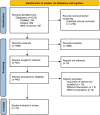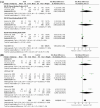Efficacy of Intravenous Ferric Carboxymaltose in Heart Failure Patients with Iron Deficiency Anemia: A Meta-analysis of 6271 Patients
- PMID: 39527395
- PMCID: PMC11638377
- DOI: 10.1007/s40261-024-01401-y
Efficacy of Intravenous Ferric Carboxymaltose in Heart Failure Patients with Iron Deficiency Anemia: A Meta-analysis of 6271 Patients
Abstract
Background: Iron deficiency is prevalent among heart failure patients and is associated with worse clinical outcomes, including decreased quality of life and functional capacity. This condition often results in a higher incidence of hospitalization and mortality. Iron supplementation, particularly with intravenous ferric carboxymaltose (FCM), has shown potential benefits as an adjunct therapy in heart failure management. This study aims to evaluate the efficacy of FCM in the treatment of patients with heart failure and iron deficiency anemia, with a focus on its impact on mortality and hospitalization rates.
Methods: A comprehensive search was conducted in PubMed, Web of Science, and Scopus databases from their inception until 1st December 2023. Meta-analysis was performed using RevMan 5.4, employing a random-model effect. The results were reported as risk ratios (RRs), standard mean differences (SMDs), and 95 % confidence intervals (CIs).
Results: The meta-analysis included 13 studies with a total of 6271 patients. Ferric carboxymaltose administration resulted in a significant improvement in the 6-minute walk distance (SMD: 1.45; 95 % CI: 0.55, 2.36; p = 0.002), quality of life, as assessed by the Kansas City Cardiomyopathy Questionnaire (KCCQ) (SMD: 1.49; 95 % CI: 0.87, 2.11; p < 0.00001), the rate of first hospitalization for heart failure or cardiovascular death (RR: 0.91; 95 % CI: 0.84, 0.98; p = 0.02). However, FCM did not show a significant impact on the risk of cardiovascular death (RR: 0.90; 95 % CI: 0.77, 1.05; p = 0.17), the need for intervention due to worsening heart failure (RR: 0.41; 95 % CI: 0.04, 4.51; p = 0.47), or all-cause mortality rates (RR: 0.89; 95 % CI: 0.69, 1.16; p = 0.28).
Conclusion: While FCM treatment in patients with heart failure and iron deficiency anemia significantly improves functional capacity and quality of life, it has no notable effect on mortality rates or the likelihood of hospitalization. These findings highlight the need for further research to explore comprehensive treatment strategies that address both the symptomatic and survival aspects of heart failure management in this patient population.
© 2024. The Author(s).
Conflict of interest statement
Declarations. Author Contributions: A.M.T. conceived the idea. A.M.T. designed the research workflow. S.A.N., S.S., M.M.G., A.A., M.R.M. and K.A. searched the databases. S.A.N., S.S., M.M.G., A.A., M.R.M. and K.A. screened the retrieved records, extracted relevant data, assessed the quality of evidence, and A.M.T. and A.S.E. resolved the conflicts. A.A. performed the analysis. A.S.E., S.A.N., S.S., M.M.G., A.A., M.R.M., and K.A. wrote the final manuscript. A.M.T. and A.S.E. supervised the project. All authors have read and agreed to the final version of the manuscript. Conflicts of Interest: The authors declare no conflict of interest. Funding: We received no funding for this study. Ethics Approval and Consent to Participate: Not applicable. Consent for Publication: Not applicable. Availability of Data and Materials: Not applicable. Code Availability: Not applicable.
Figures







References
-
- Anand IS, Gupta P. Anemia and iron deficiency in heart failure. Circulation. 2018;138(1):80–98. - PubMed
-
- McDonagh TA, Metra M, Adamo M, Gardner RS, Baumbach A, Böhm M, et al. 2021 ESC Guidelines for the diagnosis and treatment of acute and chronic heart failure. Eur Heart J. 2021;42(36):3599–726. - PubMed
-
- Heidenreich PA, Bozkurt B, Aguilar D, Allen LA, Byun JJ, Colvin MM, et al. 2022 AHA/ACC/HFSA guideline for the management of heart failure: a report of the American College of Cardiology/American Heart Association Joint Committee on Clinical Practice Guidelines. Circulation. 2022;145(18):e895-1032. - PubMed
Publication types
MeSH terms
Substances
LinkOut - more resources
Full Text Sources
Medical

